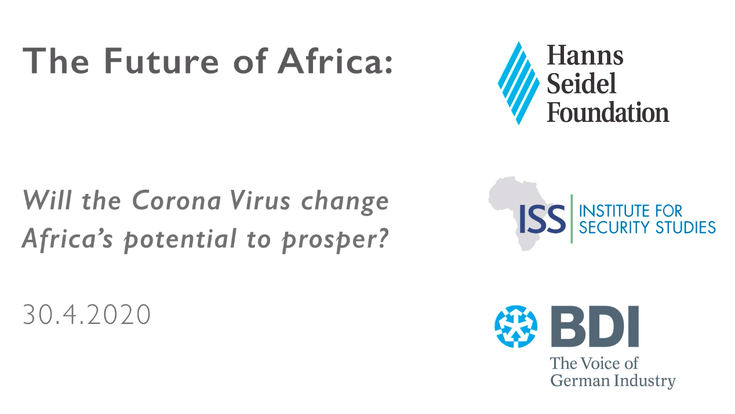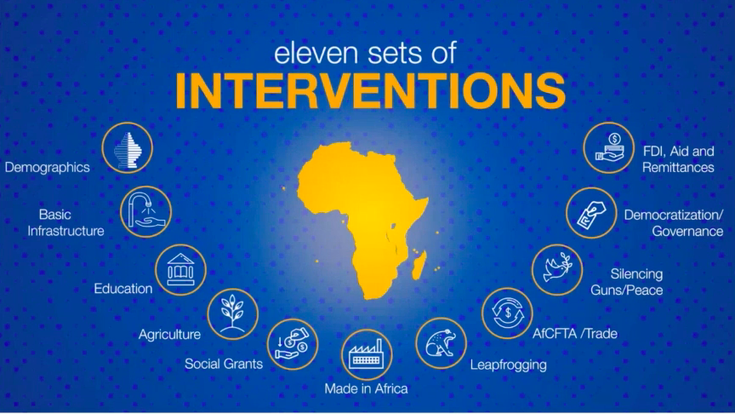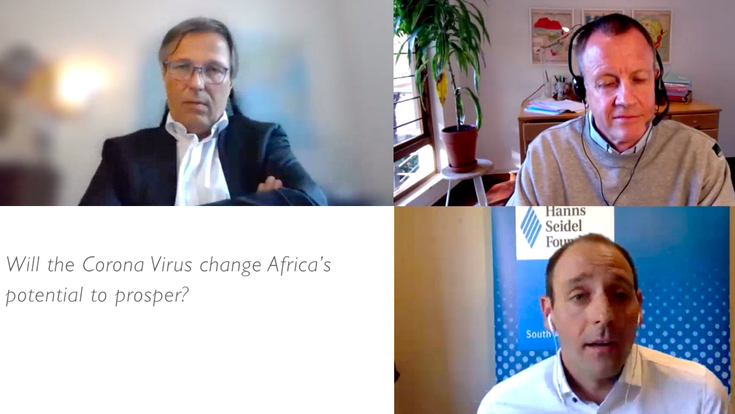Webinar with the Federation of German Industries and the ISS Africa
The Future of Africa – Will the Corona Virus affect Africa's potential to prosper?
Together with Dr Jakkie Cilliers, author of the book "Africa First! Igniting a Growth Revolution", from the Institute for Security Studies (ISS), Pretoria, and Dr Stefan Mair, Member of the Board of the Federation of German Industries (BDI), we discussed at a high-profile webinar on April 30, 2020 what investments by German companies in Africa might look like after a period of increased global uncertainty and weak economic growth, and what conditions should be created to benefit both development on the African continent and the German economy.

Invitation to the webinar held jointly by the three organisations
BDI; BDI
Covid-19 causes recession and rise in unemployment
Africa is a continent with limitless potential - it has the natural resources, a young population and geographical size to become a major player on the global stage. Yet the gap between Africa and the rest of the world is widening.
As a result of the Covid-19 crisis, sub-Saharan Africa is widely expected to slide into recession for the first time in 25 years. The UN predicts that the number of unemployed Africans will rise by 20 million by the end of the year. Since February, there has been a massive outflow of over USD 4.2 billion in capital from sub-Saharan Africa, just until the beginning of April alone.
In a worst case scenario, according to the WHO, 190,000 Africans could die from the corona virus in 2020. According to estimates by a team of experts from the Gordon Institute of Business Science (University of Pretoria) and the Institute for Security Studies, whose work is supported by the HSF, during the same time, a further 105.000 people on the African continent could lose their lives due to increasing poverty and deteriorating general health care as a result of measures put in place in response to the coronavirus.
In addition to external factors (currency devaluation, capital outflow, collapse of commodity prices and tourism), it is above all the current country-specific lockdown regulations that influence the economic prospects of individual African countries. As the current crisis affects rich and poor countries simultaneously, the annual remittances of migrants to their home countries in sub-Saharan Africa will also plunge by about 23 per cent by the end of 2020.

Areas of interventions discussed in "Africa First!"
ISS; ISS
So, what measures are needed to boost Africa's economic growth and accelerate the continent's development?
These questions are urgent: What needs to be done to unlock Africa's potential and boost economic growth? What reforms and investments are needed to enable the continent to gradually catch up with the rest of the world? Can the Coronavirus crisis be used as a catalyst to invest in the structural modernisation of African economies? And can the expected restructuring and diversification of global supply chains represent an opportunity for Africa and foreign investors?
Dr Jakkie Cilliers, Head of the African Futures and Innovation Programme at the ISS, presented the research findings published in his new book "Africa First! - Igniting a Growth Revolution", and explained how Africa is most likely going to develop up to 2040, using a range of key indicators - and what measures would be needed in areas such as agriculture, manufacturing, population growth, health, sanitation and governance to accelerate Africa's development in a sustainable manner.
The book project was supported by the Hanns Seidel Foundation. It is the result of a study series of the African Futures & Innovation Programme of the renowned Institute for Security Studies, an important and long-standing partner of the foundation on the African continent. The book is available in many book stores, online on a number of websites and at www.jakkiecilliers.org.

Dr Stefan Mair, member of the board of the Federation of German Industries (BDI), Dr Jakkie Cilliers, Author of "Africa First" and Hanns Bühler, Regional Representative of the HSF in Southern Africa
BDI; BDI
German companies in Africa - opportunities and responsibilities
Dr Mair of the BDI related the long-term forecasts and recommendations formulated in Africa First! to the opportunities and challenges that African markets offer German investors. He explained what conditions must be in place for German entrepreneurs to increasingly perceive Africa as a continent of opportunity and a market of the future.
German companies cannot only benefit from Africa's great potential, but also help to advance the modernisation of African economies and their integration into regional and international production and trade chains. The discussion offered participants from the political and business spheres on two continents the opportunity to debate Africa's future with a panel of renowned experts.
For an introduction to the long-term prognoses formulated in "Africa First!" watch this short information video:
https://issafrica.org/media-resources/videos-and-infographics/africa-has-boundless-potential
To watch a recording of the informative, stimulating webinar, follow this link:
